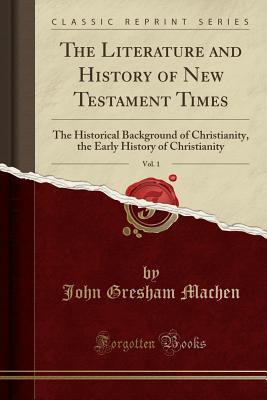- Bíblia
- Leia a Bíblia
- Versões da Bíblia
- Verso do dia
- Planos de Leitura
- Versos por Tópico
- Books of the Bible
- Imagens bíblicas
- Estude
- Comentários
- Concordâncias
- Dicionários
- Enciclopédias
- Sermões
- Bible Atlas & Maps
- BP Wiki
- Devocionais
- Devocionais de hoje
- Light of the World
- Todos os devocionais
- Inspirational Quotes
- Mais
- Picture Quotes
- Videos
- Inspirador
- Estudo da Bíblia
- O que a Bíblia diz
- Bible Q&As
- Daily Bread
- Bible by Genre
- Bible Stories
- Random Bible Verse
- Comunidade
- Store
The Literature and History of New Testament Times, Vol. 1: The Historical Background of Christianity, the Early History of Christianity (Classic Reprint)
by J. Gresham Machen
Excerpt from The Literature and History of New Testament Times, Vol. 1: The Historical Background of Christianity, the Early History of Christianity
The Teacher's Manual, therefore, is intended not merely to offer suggestions as to methods of teaching, but primarily to sup plement the teacher's knowledge. A teacher who knows only what he actually imparts to the class is inevitably dull. The true teacher brings forth out of his treasure things new and old.
The sections in the Teacher's Manual, since they are intended to be supplementary, should not be read until after careful attention has been paid to the corresponding sections in the Student's Text Book. Moreover, both sections together are of course in them selves insufficient. They should be supplemented by other read ing. Suggestions about reading have been put at the end of every lesson. Here, however, a few general remarks may be made.
About the Publisher
Forgotten Books publishes hundreds of thousands of rare and classic books. Find more at www.forgottenbooks.comwww.forgottenbooks.com
This book is a reproduction of an important historical work. Forgotten Books uses state-of-the-art technology to digitally reconstruct the work, preserving the original format whilst repairing imperfections present in the aged copy. In rare cases, an imperfection in the original, such as a blemish or missing page, may be replicated in our edition. We do, however, repair the vast majority of imperfections successfully; any imperfections that remain are intentionally left to preserve the state of such historical works.
The Teacher's Manual, therefore, is intended not merely to offer suggestions as to methods of teaching, but primarily to sup plement the teacher's knowledge. A teacher who knows only what he actually imparts to the class is inevitably dull. The true teacher brings forth out of his treasure things new and old.
The sections in the Teacher's Manual, since they are intended to be supplementary, should not be read until after careful attention has been paid to the corresponding sections in the Student's Text Book. Moreover, both sections together are of course in them selves insufficient. They should be supplemented by other read ing. Suggestions about reading have been put at the end of every lesson. Here, however, a few general remarks may be made.
About the Publisher
Forgotten Books publishes hundreds of thousands of rare and classic books. Find more at www.forgottenbooks.comwww.forgottenbooks.com
This book is a reproduction of an important historical work. Forgotten Books uses state-of-the-art technology to digitally reconstruct the work, preserving the original format whilst repairing imperfections present in the aged copy. In rare cases, an imperfection in the original, such as a blemish or missing page, may be replicated in our edition. We do, however, repair the vast majority of imperfections successfully; any imperfections that remain are intentionally left to preserve the state of such historical works.
BUY NOW
Paperback, 292 pages
Published April 23rd 2018 by Forgotten Books (first published September 27th 2015)
Se inscrever
© 2025 Bibleportal.com Todos os direitos reservados.

Born in Baltimore, Maryland, he came from a wealthy and well-educated background. He studied at John Hopkins University and then went to Princeton Theological Seminary, receiving an M.A. in philosophy. He studied in Germany and returned to teach New Testament at Princeton. He received his B.D. in 1905 and was ordained in the Presbyterian Church.
In 1929, he left Princeton Seminary when the institution capitulated to the liberal faction, and he, along with others, founded Westminster Theological Seminary. In 1934 he was censured by the Presbyterian Church for his actions in relation to the Presbyterian Board of Foreign Missions, the liberal bias of which he opposed. In 1935 he was defrocked by the Presbyterian Church over major doctrinal issues. Machen then established the Orthodox Presbyterian Church as a reaction to the liberalism of the Presbyterian hierarchy. He died at age 55, of pneumonia.
... Show more